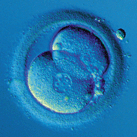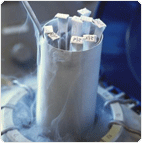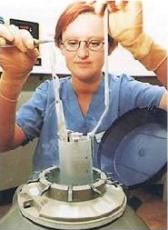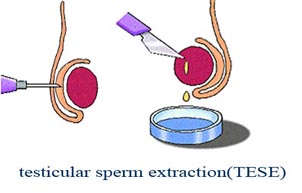Sex Selection:  | Human sex selection can be accomplished at pre-implantation of an embryo. It has been marketed under the title family balancing. There are two major types of pre- implantation methods which can be used for sex selection.
|
Human sex selection can be accomplished at pre-implantation of an embryo. It has been marketed under the title family balancing. There are two major types of pre-implantation methods which can be used for sex selection. Sperm sorting - The separation of X Chromosome sperm from Y Chromosome sperm. The resulting sorted sperm are used in either artificial insemination or in-vitro fertilization (IVF) procedures. Pre-implantation genetic diagnosis (PGD) - In sex selection cases, embryos resulting from IVF procedures are genetically tested for X or Y Chromosomes. The embryos of the desired sex are then implanted.
More support for sex selection
The American Society for Reproductive Medicine has paved the way for its members to help couples choose the sex of their babies. Australian professionals, however, remain divided on the issue. A report from the American Society's Ethics Committee says that the use of medical technologies by couples seeking "gender variety" in their offspring is acceptable under certain conditions. The stand is a relaxation of an earlier position, which held that the use of IVF and pre-implantation genetic diagnosis for the sole purpose of sex selection should be "discouraged" because it holds the risk of "unwarranted gender bias, social harm and the diversion of medical resources from genuine medical need". "They've certainly become more liberal in their view," comments Dr Julian Savulescu of the Murdoch Childrens Research Institute. Dr Savulescu is an advocate for sex selection. He argues that objections to medically assisted sex selection based on possible harm to the child, the parents, or society, are not compelling, particularly in Australia. In addition to pre-implantation genetic diagnosis (PGD), a foetus's sex can also be tested using chorionic villus sampling (CVS) at around 11 weeks, followed by abortion if it is the 'wrong' sex. While Dr Savulescu acknowledges that the CVS technique carries increased risks of miscarriage, he says that PGD has been shown to be safe and that 300 children had been born world-wide using the technology. Professor Gab Kovacs, of the Royal Australian and New Zealand College of Obstetricians and Gynaecologists and Monash IVF, says the College does not condone discarding embryos on the basis of sex. However, he says, there may be an argument for sex selection in some circumstances. "One must look at the best interests of the child. If the parents are obsessed enough to try and have a child of a particular sex, it may be in the child's best interest to make sure it is the sex that is desired." There are no national laws governing sex selection in Australia. Sex selection is available through a company in Sydney but is banned in some states, including Victoria and South Australia. Sex selection "inevitable" The University of Tasmania's Dr Chris Newell says that the ethical acceptability of embryo sex selection is "inevitable" if people accept the selection of embryos on the basis of disease."It's a logical extension," he says. "If you argue it's the parent's right to choose, how can you say it's okay for them to choose on the basis of one characteristic but not on another?"Dr Savulescu argues there may be a case for differential application of sex selection technologies. They may be less appropriate in countries like India and China, where it may be better to try and reduce systematic discrimination against females rather than the number of females born, he says.However, Dr Savulescu does not think social conditions in different countries can be used to argue against selection on the basis of disability - because disability, unlike gender, he says, is "inherently bad".Dr Newell disagrees: "Disability is not inherently bad. Most of the problems caused by disability are the stigma and discrimination by society. Just like gender, the acceptability of disability and ethnicity depends on society."Dr Newell describes the debate on this issue in Ausralia as "impoverished". "We need to move beyond the right of couples to choose, to asking whether it is good ethics to select various attributes for our children," he says. Boy or Girl? News of a US study, launched to investigate the social effects of allowing parents to choose the sex of their child, has re-focused attention on the contentious issues surrounding sex selection. Dominique Driver delves into the UK government?s current policy on the use of reproductive technologies, and asks how the public in the UK feels about sex selection.
Sandra Carson and her team needed nine years to gain approval from their review board at Baylor College of Medicine in Houston, Texas. The study will be made possible by a technique known as Pre-implantation Genetic Diagnosis (PGD). PGD involves extracting the DNA of a single cell of an eight-cell stage embryo created by In Vitro Fertilisation (IVF) for determining the sex as well as checking for genetic abnormalities. After result evaluation, the ?desired? embryos can then be implanted into the mother?s uterus. At least fifty couples are currently lined up to take part in the trial, but only those who already have a child of the opposite sex will be enrolled, a practice known as ?family balancing?. The use of PGD for sex selection is legal in the US, though, the American Society for Reproductive Medicine (ASRM) and the American College of Obstetricians and Gynecologists (ACOG) have openly stated their opposition to using PGD in this way. Across the Atlantic, at the UK front, social sex selection is currently banned and the Human Fertility and Embryology Authority (HFEA) who regulate the all reproductive technology will only licence PGD for serious medical conditions.
|








